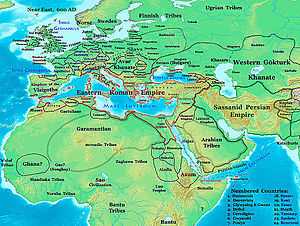Kutrigurs

The Kutrigurs was a horde of equestrian nomads (later known as part of the Bulgars) that inhabited the Eurasian plains during the Dark Ages.
History
They were first mentioned in 539–40 under the leadership of Shaush. They may have come into existence when the Akacires under Dengizich were conquered by the Onogurs in the 460s. The conquest of the easternmost Kutrigurs by Gökturk arrivals led by three brothers from the Imaon Mountains in the 6th century is mentioned by Bar Hebraeus, as well as in the Chronicle of the late 12th century Jacobite patriarch of Antioch Michael the Syrian.[1] At this time they came to be dominated by clans related to the Gökturks.
In 632, Kubrat united the Kutrigur and Onogur tribes who lived in Scythia. Upon their unification, the state which East Roman scholars referred to as Old Great Bulgaria was established. The Kutrigurs may also be viewed among members of the Sarmatian union.[2]
When the Khazar state expanded, it challenged the dominance of Old Great Bulgaria. The Khazars were able to obtain tribute from Batbayan, Kubrat's eldest son, and so came the downfall of Great Bulgaria. In the mid–7th century, a dissenting faction of Kutrigurs seems to have traveled to the upper Volga where, along with part of the Utigurs, they founded the state of Volga Bulgaria with Kotrag as its ruler. A group of Kutrigurs migrated to Ravenna at the same time, under the leadership of a certain Alcek, mentioned in a peace treaty.
Under the leadership of Kuber, another part of the Kutrigur tribe seems to have moved to Sirmium (Pannonia) and from there south to the Pelagonian plain. Thereafter they disappear from history as a separate Bulgar group. Kuber's Kutrigur Bulgars displaced some of the populations that had already settled in the region of Macedonia, and intermingled with the populations that remained. In the 8th century, the Kuber Bulgars merged with Asparuh's Bulgars who had already settled on both sides of the Danube River in the late 7th century.
People
See also
References
- ↑ В.Златарски, Известието на Михаил Сирийски за преселението на българите. Том V: Избрани произведения, София, 1972,с.52. (The notice of Michael the Syrian of the migration of Bulgars. Selected works, Volume 5, Sofia, 1972, page 52)
- ↑ O. Karatay, In Search of the Lost Tribe: The Origins and Making of the Croation Nation, 2003, p. 11.